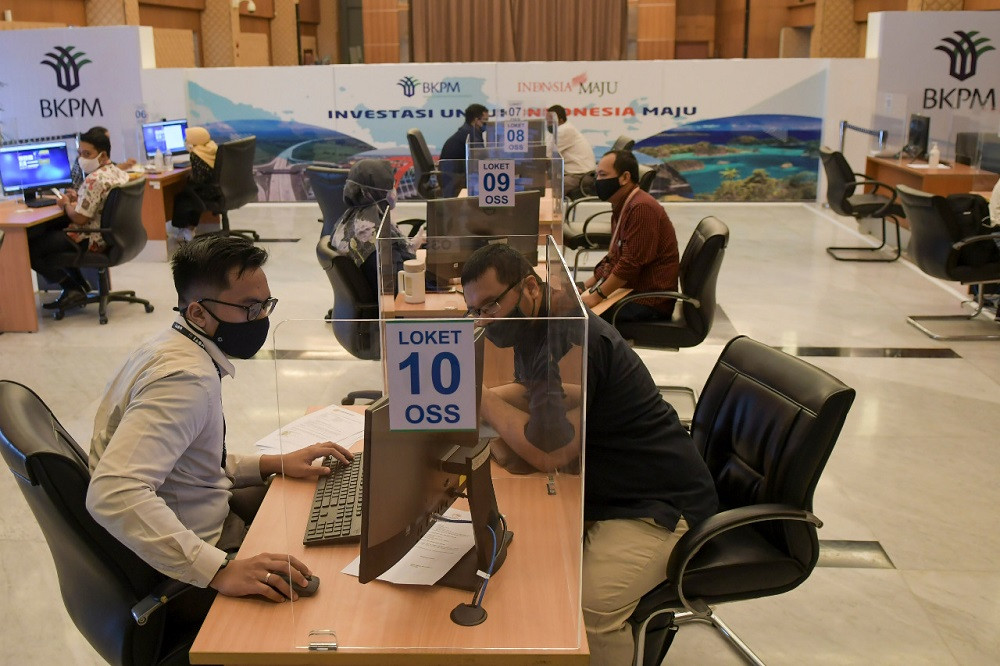Popular Reads
Top Results
Can't find what you're looking for?
View all search resultsPopular Reads
Top Results
Can't find what you're looking for?
View all search resultsTerritorial taxation: A new way to attract investment
Under a territorial system, a tax resident will only be taxed on income earned within the resident country.
Change text size
Gift Premium Articles
to Anyone
T
he government has enacted the Job Creation Law. This law is intended to support job creation by offering huge opportunities for new investment. Hence, several relevant laws were amended, including tax laws, to improve Indonesia’s ease of doing business and to stimulate the repatriation of funds and new investment.
The changes have fundamentally transformed Indonesia’s tax system, from a worldwide tax system to a territorial tax system. Under a worldwide system, a tax resident is taxed on income earned in the country of residence and foreign countries. Indonesia had used a worldwide system for years before the enactment of the Job Creation Law.
Many countries been shifting from a worldwide system to a territorial system. Under a territorial system, a tax resident will only be taxed on income earned within the resident country. This means that no income sourced from foreign countries will be taxed in the country of residence.
The choice of a territorial system is commonly to encourage outbound investment. This is because, for a company that invests abroad through a subsidiary in a foreign country and receives a dividend from such subsidiary, the dividend will not be taxed in the company’s country of residence.
Nearly all Organization for Economic Cooperation and Development (OECD) countries have begun using a territorial system. By the end of 2011, 28 of the 34 OECD countries had shifted to territorial systems, followed by the United States in 2017. Among ASEAN countries, Malaysia and Singapore have adopted a territorial tax system. The IMF in a 2013 working paper, also classified countries that provide tax exemptions for particular offshore income as territorial countries.
The territorial system in the Job Creation Law provides exemptions for the following: (1) foreign dividends or profits after tax of a permanent establishment (PE) owned abroad, (2) other income earned or received abroad other than through a PE and (3) foreign income of certain expatriates working in Indonesia who are Indonesian tax residents.
The exemption will be applied to foreign dividends or profits after tax of a PE owned abroad, provided that at least 30 percent of the dividend or profit after tax of the PE is repatriated and invested in Indonesia for a certain period. The objective of such an exemption is to eliminate double taxation. Before the enactment of the Job Creation Law, Indonesia used a classical system in which profits were taxed twice, at the corporate level when the profit was booked and in the hands of the shareholders upon the distribution of dividends.
The tax exemption provision also aims to repatriate offshore capital. The previous tax amnesty program assisted in the repatriation of Rp 146.7 trillion (US$10.4 billion). This new system is expected to invite more funds to be repatriated as no tax will be levied on such repatriation. Moreover, the exemption is expected to increase the number of corporate headquarters established in Indonesia.
However, it is still not certain whether the exemptions will encourage full repatriation given that the 70 percent portion of the dividend that is not repatriated to Indonesia will still be exempted from Indonesian tax. The taxpayer could still get the exemption without the need to invest the whole dividend in Indonesia.
In addition, the dividend exemptions in the Job Creation Law may overlap with Indonesia’s Controlled Foreign Companies (CFC) rules. The current CFC rules define a dividend as all undistributed profit after tax whereas the new law will not allow the taxation of undistributed dividends provided that the dividends invested in Indonesia meet the 30 percent threshold.
Moreover, with regard to the implementation of the 30 percent threshold in the new law, more guidance in the implementing regulation is needed to clarify the interaction between the dividend exemption in the new law and the CFC rules. Alternatively, the CFC rules could be revised to accommodate the changes in the new law.
Previously, if a foreign resident was present in Indonesia for more than 183 days out of twelve months, the resident was regarded as an Indonesian resident and was taxed in Indonesia on his or her worldwide income. However, after the Job Creation Law came into effect, a nonresident or expatriate with certain expertise will be provided an exemption on his or her offshore income for four years after becoming an Indonesian resident. This regime is intended to attract the best talent from other countries and encourage the transfer of knowledge and technology.
However, if the expatriate applies a tax treaty between Indonesia and the country where the income is sourced, the exemption provided in this regime cannot be granted. Accordingly, to enjoy the expatriate regime, the benefit of applying a tax treaty should be given up.
To conclude, the fundamental changes in Indonesia’s tax system, accompanied by the reduction of the corporate tax rate are considered positive moves and may increase foreign direct investment. However, the application of the new system should not trigger aggressive tax planning.
The incentives should go to real investors rather than being used as a tax avoidance vehicles. Therefore, the government must closely watch the use of incentives.
***
Both writers are tax analysts at the Finance Ministry’s Fiscal Policy Agency. The views expressed are personal.










